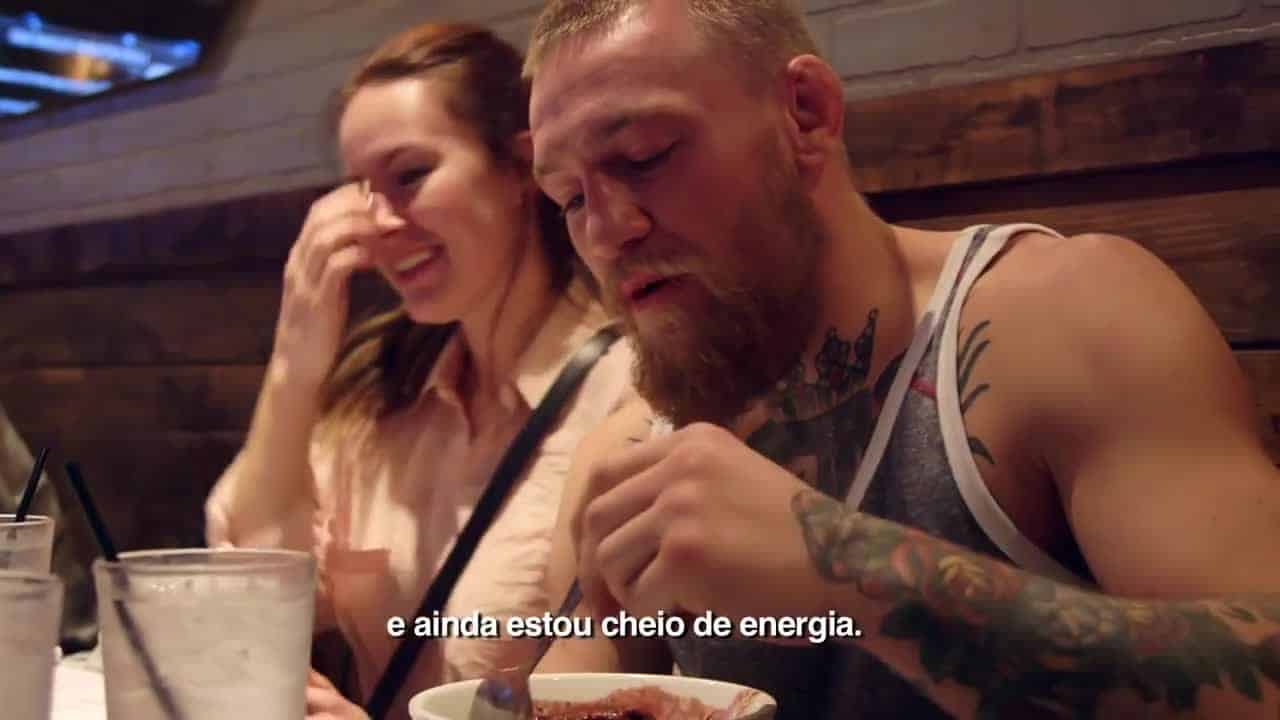Every high-level professional athlete has to keep track of their diet to achieve the best results. That includes the intake of water, carbs, proteins, fats, and other nutrients.
However, it becomes even more tricky for UFC fighters because they need to be at the exact same weight as their opponents. So, what do UFC fighters eat to achieve that?
For UFC fighters, it’s all about balanced nutrition. The proper intake of proteins, carbs, vitamins, fats, and other nutrients is crucial for peak performance and health and weight regulation. When a fighter is in the weight-cutting process, though, things get more complicated.
Cutting weight isn’t the same process as losing weight, and nutritionists and medical experts should highly supervise it. It can be a health hazard if not done correctly, and it’s a lot harder to accomplish success if the fighter doesn’t take care of their diet before the weight cut.
Let’s look at what UFC fighters generally eat before, during, and after the cut.
What Do UFC Fighters Generally Eat?
When I say generally, I’m referring to the fighter’s normal diet, when they are in training camp or periods in between fights. That’s when UFC fighters should eat what every other professional athlete eats, which is a balanced, nutritious diet.
However, MMA training can be a lot more intense than other forms of training, so the fighters burn a lot more fat and calories during their training. That’s why they need to slightly adjust their nutrition and diet according to their desired weight, gender, and training intensity.
As they inch closer to fight night, the training gets more intense, so they need more calories.
Every fighter has a unique metabolism and should have nutritionists develop a diet plan that works best for their metabolism. That’s why I’ll disregard weight classes, gender, and other factors that vary from fighter to fighter and speak in more broad, general terms.
Many people think that professional athletes have to avoid carbs and fats completely and load up only on protein, but that’s far from the truth. UFC fighters need a balanced diet daily.
That includes fats, proteins, carbohydrates, vitamins, electrolytes, and minerals the body needs. Also, they have to keep good hydration in mind at all times.
Of course, you don’t intake the same amount of all those nutrients but balance them according to the fighter’s metabolism. The foods to consume to get those nutrients will depend on the nutrient you need.
Protein and good fats can come from poultry, dairy products, eggs, red meat, fish, or even bacon. The most popular choices for carbs are rice, potatoes, and bread.
In terms of drinks, water, unsweetened coffee, and tea are quite common, along with protein shakes, including bananas, berries, protein powders, and other fruits and veggies.
Finally, every fighter needs to get all the vitamins and electrolytes in their body, such as magnesium, sodium, potassium, chloride, etc. The best way to do it is to consume light nutrients such as green vegetables and fruits, including melons, broccoli, spinach, etc.
How Many Calories Do UFC Fighters Eat?
As I mentioned before, the number of calories a fighter needs to eat will depend on several factors, including their overall weight, training intensity, etc. Usually, an average athlete has to take between 3000 and 3500 calories a day to maintain their day. As the training intensifies, more calories are needed.
However, not all calories provide you with the same amount of energy. For instance, candy bars and junk food have many calories, but those are bad calories with low nutritional value.
That’s why you should be careful about which kinds of calories you are ingesting, not only how much.
That being said, one hour of intense MMA training burns anywhere between 1700 and 2000 calories. When fighters are in the last days of training camp, they do at least two hours of training a day. When you add regular daily activities to that, you end up with around 4500-5000 spent calories each day.
It’s extremely hard to ingest that many calories through food, so many fighters use supplements, protein shakes, and energy bars to maintain their weight. When they get to the last week before the fight and the weight cut ensues, their diet drastically changes.
Therefore, an average UFC fighter eats around 3000 calories a day during normal training, and as training camp intensifies, the number goes upwards of 4500 cal a day.
What Do UFC Fighters Eat To Cut Weight?
As fighters enter fight week, most of them have to go through the weight-cutting process. They do it to satisfy the weight class requirements and gain an advantage over their opponent in the fight.
For instance, a fighter competing in the 170 lbs division has a 185 lbs waking weight, meaning they need to cut 15 lbs to get to their desired weight.
They do it by dehydrating significantly, and after the weigh-ins, they have around 24 hours to rehydrate and get those pounds back before the fight.
So, how can you lose 15-20 lbs in a week and then get it all back on in 24 hours without losing energy or cause health problems.
Before I get into that, I have to advise not to try this without nutritionists and medical experts, as weight cuts can be dangerous even for UFC fighters, let alone amateur athletes.
The weight cutting usually lasts for five days, and one of the most important parts of the process is water intake. You start with an extremely high water intake the first day (around 2 gallons of water) to get your body into “flush mode.”
Then, you gradually reduce the water intake over the next days; 1 gallon on the 2nd day, half a gallon on the 3rd and 4th day, until you get to no water on the weigh-in day until the weigh-in is complete.
When your body is in flush mode, but you cut back on the water intake, it leads to – you guessed it – dehydration.
During the weight cut, you have to keep your carb intake to a minimum – not completely off because it will deplete your energy too much, but only 50 grams a day will be enough. Carbohydrates pull water into the body, which is a counter-effect of what you want to achieve, and that’s dehydration.
The same thing goes for eating starches, sugars, and salt. It’s too many calories, and it pulls water into the organism, which will lead to an unsuccessful weight cut. Instead, eat protein-rich food to conserve energy, such as poultry, leafy vegetables, eggs, etc. It might taste bland due to the lack of salt, but it will help.
Finally, if you need to cut extreme amounts of weight, consider using a natural diuretic such as dandelion root to get that extra liquid out of the body. Hot baths and saunas also help but don’t use diuretics or baths without medical experts’ presence.
If you do everything properly, it should be sufficient to make the desired weight.
What Do UFC Fighters Eat After Weigh-Ins?
Immediately after the weigh-ins, you must work fast to rehydrate your body and get all the electrolytes and energy back to a normal state. During the process, UFC fighters usually gain 10-15 lbs back that they lost during the weight cut.
First, drink water or an energy drink immediately after weigh-ins to start rehydrating your body. Take small sips and no more than 1 liter of fluid an hour, as your body can’t digest more.
Next, start with shakes instead of solid food until you rehydrate because your digestion can’t work properly without fluid, especially the enzymes in your saliva.
Those shakes need to have protein and carbs in them. Two hours after weigh-ins, you’ll rehydrate your body enough so that you can eat solid food again.
At this stage, it’s all about regaining that strength and energy you had before the cut. The best way to do it is to give your body carbs, but don’t go overboard to cause indigestion or other digestive problems.
Your best choice might be red meats, rice, potatoes, and other energy-rich foods.
What Do UFC Fighters Eat Before A Fight?
Finally, we come to the last meals before the fights. I can’t stress how important those meals are, especially for UFC fighters that want to be at their best performance when competing in a brutal fight that is elite MMA.
On the day of the fight, fighters usually go for a big breakfast, like pancakes, eggs, bacon, steak, potatoes, etc. You go hard on your breakfast to give yourself enough time to digest everything before the fight and get enough energy into your system. The lunch should be lighter in smaller, usually including veggies, fruit plates, etc.
Before the fight, UFC fighters usually keep an empty stomach. I don’t mean they go hungry, just that they don’t eat anything that’ll make them feel full.
Instead, some take pre-workout drinks loaded with nutrients, including vitamins, minerals, and caffeine, to keep their energy, focus, and concentration as high as possible.
Also, most fighters take painkillers around half an hour before the fight for obvious reasons. In the end, what a fighter eats before a fight will highly depend on the fighter and what works best for them.
That’s why they all have professional nutritionists carve out their diet plan to get the most out of their bodies and minds when they step into that cage.

